Related Research Articles

Countee Cullen was an American poet, novelist, children's writer, and playwright, particularly well known during the Harlem Renaissance.

Rita Frances Dove is an American poet and essayist. From 1993 to 1995, she served as Poet Laureate Consultant in Poetry to the Library of Congress. She is the first African American to have been appointed since the position was created by an act of Congress in 1986 from the previous "consultant in poetry" position (1937–86). Dove also received an appointment as "special consultant in poetry" for the Library of Congress's bicentennial year from 1999 to 2000. Dove is the second African American to receive the Pulitzer Prize for Poetry, in 1987, and she served as the Poet Laureate of Virginia from 2004 to 2006. Since 1989, she has been teaching at the University of Virginia in Charlottesville, where she held the chair of Commonwealth Professor of English from 1993 to 2020; as of 2020, she holds the chair of Henry Hoyns Professor of Creative Writing.

The Kenyon Review is a literary magazine based in Gambier, Ohio, US, home of Kenyon College. The Review was founded in 1939 by John Crowe Ransom, critic and professor of English at Kenyon College, who served as its editor until 1959. The Review has published early works by generations of important writers, including Robert Penn Warren, Ford Madox Ford, Robert Lowell, Delmore Schwartz, Flannery O'Connor, Boris Pasternak, Bertolt Brecht, Peter Taylor, Dylan Thomas, Anthony Hecht, Maya Angelou, Rita Dove, Derek Walcott, Thomas Pynchon, Don Delillo, Woody Allen, Louise Erdrich, William Empson, Linda Gregg, Mark Van Doren, Kenneth Burke, and Ha Jin.

Helene Johnson was an African-American poet during the Harlem Renaissance. She is remembered today for her poetry that captures both the challenges and the excitement of this era during her short-lived career.
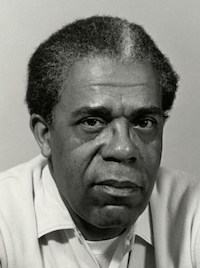
Dudley Randall was an African-American poet and poetry publisher from Detroit, Michigan. He founded a pioneering publishing company called Broadside Press in 1965, which published many leading African-American writers, among them Melvin Tolson, Sonia Sanchez, Audre Lorde, Gwendolyn Brooks, Etheridge Knight, Margaret Walker, and others.

Niggerati was the name used, with deliberate irony, by Wallace Thurman for the group of young African-American artists and intellectuals of the Harlem Renaissance. "Niggerati" is a portmanteau of "nigger" and "literati". The rooming house where he lived, and where that group often met, was similarly christened Niggerati Manor. The group included Zora Neale Hurston, Langston Hughes, and several of the people behind Thurman's journal FIRE!!, such as Richard Bruce Nugent, Jonathan Davis, Gwendolyn Bennett, and Aaron Douglas.
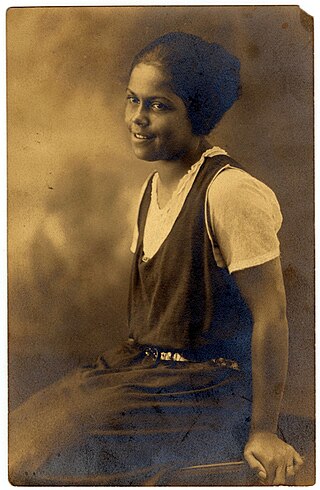
Gwendolyn B. Bennett was an American artist, writer, and journalist who contributed to Opportunity: A Journal of Negro Life, which chronicled cultural advancements during the Harlem Renaissance. Though often overlooked, she herself made considerable accomplishments in art, poetry, and prose. She is perhaps best known for her short story "Wedding Day", which was published in the magazine Fire!! and explores how gender, race, and class dynamics shape an interracial relationship. Bennett was a dedicated and self-preserving woman, respectfully known for being a strong influencer of African-American women rights during the Harlem Renaissance. Throughout her dedication and perseverance, Bennett raised the bar when it came to women's literature and education. One of her contributions to the Harlem Renaissance was her literary acclaimed short novel Poets Evening; it helped the understanding within the African-American communities, resulting in many African Americans coming to terms with identifying and accepting themselves.
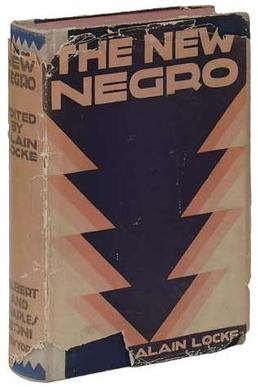
The New Negro: An Interpretation (1925) is an anthology of fiction, poetry, and essays on African and African-American art and literature edited by Alain Locke, who lived in Washington, DC, and taught at Howard University during the Harlem Renaissance. As a collection of the creative efforts coming out of the burgeoning New Negro Movement or Harlem Renaissance, the book is considered by literary scholars and critics to be the definitive text of the movement. Part 1 of The New Negro: An Interpretation, titled "The Negro Renaissance", includes Locke's title essay "The New Negro", as well as nonfiction essays, poetry, and fiction by writers including Countee Cullen, Langston Hughes, Zora Neale Hurston, Claude McKay, Jean Toomer, and Eric Walrond.
Owen Vincent Dodson was an American poet, novelist, and playwright. He was one of the leading African-American poets of his time, associated with the generation of black poets following the Harlem Renaissance. He received a fellowship from the Rosenwald Foundation for a series of one-act plays.

Rachel Blau DuPlessis is an American poet and essayist, known as a feminist critic and scholar with a special interest in modernist and contemporary poetry. Her work has been widely anthologized.
Houston Alfred Baker Jr. is an American scholar specializing in African-American literature and Distinguished University Professor of English at Vanderbilt University. Baker served as president of the Modern Language Association, editor of the journal American Literature, and has authored several books, including The Journey Back: Issues in Black Literature and Criticism, Modernism and the Harlem Renaissance (1987), Blues, Ideology, and Afro-American Literature (1984), and Workings of the Spirit: The Poetics of Afro-American Women's Writing (1993), as well as editing literary collections. Baker was included in the 2006 textbook Fifty Key Literary Theorists, by Richard J. Lane.
Ahmos Zu-Bolton II was an activist, poet and playwright also known for his editing and publishing endeavors on behalf of African-American culture.

William Waring Cuney was a poet of the Harlem Renaissance. He is best known for his poem "No Images," which has been widely anthologized.
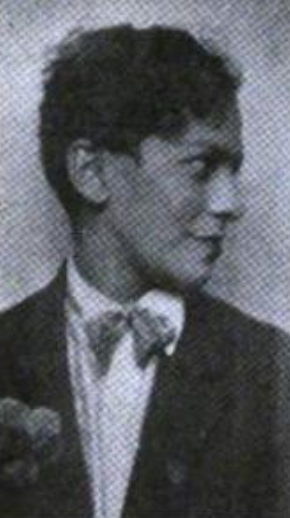
Mae VirginiaCowdery was an African-American poet based in Philadelphia, Pennsylvania. She is considered part of the wide-ranging artistic efforts inspired by the Harlem Renaissance in New York City.
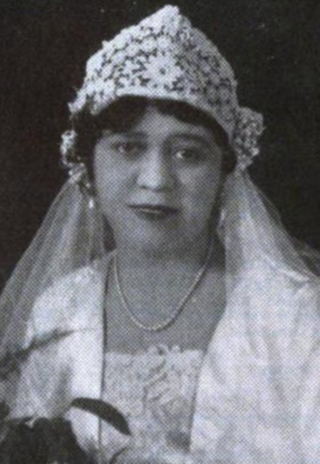
Nina Yolande Du Bois, known as Yolande Du Bois, was an American teacher known for her involvement in the Harlem Renaissance. She was the daughter of W.E.B. Du Bois and the former Nina Gomer. Her father encouraged her marriage to Countee Cullen, a nationally known poet of the Harlem Renaissance. They divorced within two years. She married again and had a daughter, Du Bois's only grandchild. That marriage also ended in divorce.

Harold Jackman was a British-born teacher, model, and patron of the arts with emphasis on African American art and literature. Raised in Harlem, Jackman was known for his involvement in the Harlem Renaissance and his dedication to preserving African American cultural artifacts. He founded the Countee Cullen Memorial Collection at Atlanta University and contributed to the James Weldon Johnson Collection of Yale University, the Literary Collection of Fisk University, and to the Schomburg Collection at the Harlem branch of the New York Public Library. Along with Regina M. Anderson and Dorothy Randolph Peterson, he was also a co-founder of the Harlem Experimental Theater.
Caroling Dusk: An Anthology of Verse by Black Poets of the Twenties: Anthology of Black Verse is a 1927 poetry anthology that was edited by Countee Cullen. It has been republished at least three times, in 1955, 1974, and 1995 and included works by thirty-eight African-American poets, including Paul Laurence Dunbar, Langston Hughes, Georgia Douglas Johnson, James Weldon Johnson, and Claude McKay. The anthology also includes biographical sketches of the poets whose work is included in the book.
The Book of American Negro Poetry is a 1922 poetry anthology that was compiled by James Weldon Johnson. The first edition, published in 1922, was "the first of its kind ever published" and included the works of thirty-one poets. A second edition was released in 1931 with works by nine additional poets.
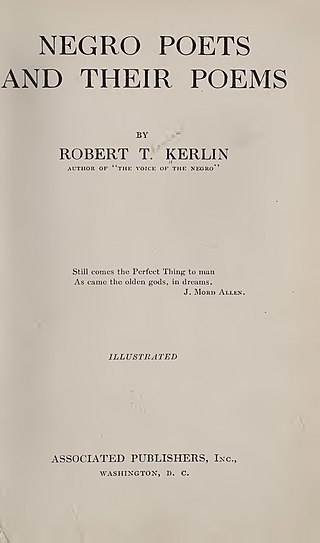
Negro Poets and Their Poems is a 1923 poetry collection by Robert T. Kerlin. It was one of the major anthologies of African American poetry published during the Harlem Renaissance and has been cited as a valuable source of information on the era.
An Anthology of Verse by American Negroes is a 1924 poetry anthology compiled by Newman Ivey White and Walter Clinton Jackson. The anthology is considered one of the major anthologies of black poetry to be published during the Harlem Renaissance, and was republished in 1969. In reviews, the anthology has been positively received for the effort it made to compile poetry, but criticized for ambiguous criticism and poor selection of poems.
References
- ↑ Cullen, "Incident", Poetry Foundation.
- ↑ Countee Cullen, at the Poetry Foundation; retrieved August 16, 2024
- ↑ Countee Cullen: Baltimore's Brush with the Harlem Renaissance, at the Baltimore Literary Heritage Project; via archive.org; archived September 14, 2007; retrieved August 16, 2024
- ↑ A Poet a Day: Rita Dove Reads Countee Cullen, by Theresa Riley; at BillMoyers.com; filmed 2012; posted at BillMoyers.com, June 16, 2020; retrieved August 16, 2024
- ↑ African American Protest Poetry, by Trudier Harris; at the National Humanities Center; published no later than November 27, 2010 (earliest revision on archive.org); retrieved August 16, 2024
- ↑ On "Incident", by Rachel Blau Duplessis; in Genders, Races, and Religious Cultures in Modern American Poetry, 1908-1934; published 2001 by Cambridge University Press; archived at the University of Illinois
- ↑ Repression and Recovery: Modern American Poetry and the Politics of Cultural Memory, 1910-1945, by Cary Nelson; p. 23-24; published 1989 by University of Wisconsin Press